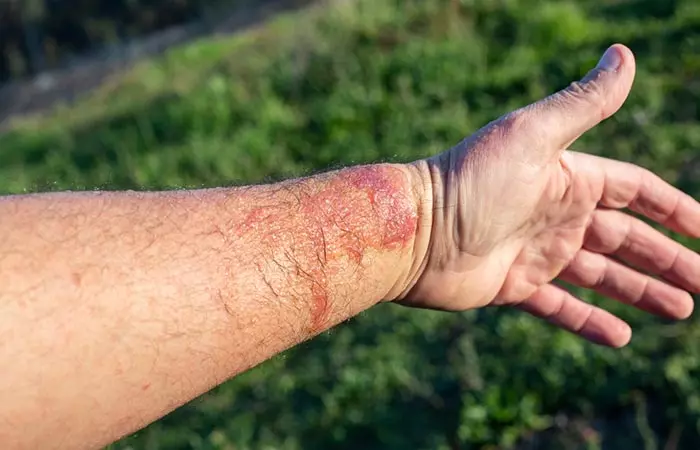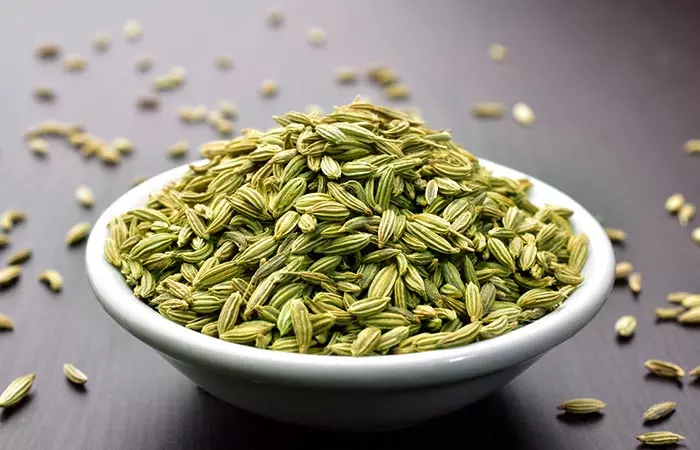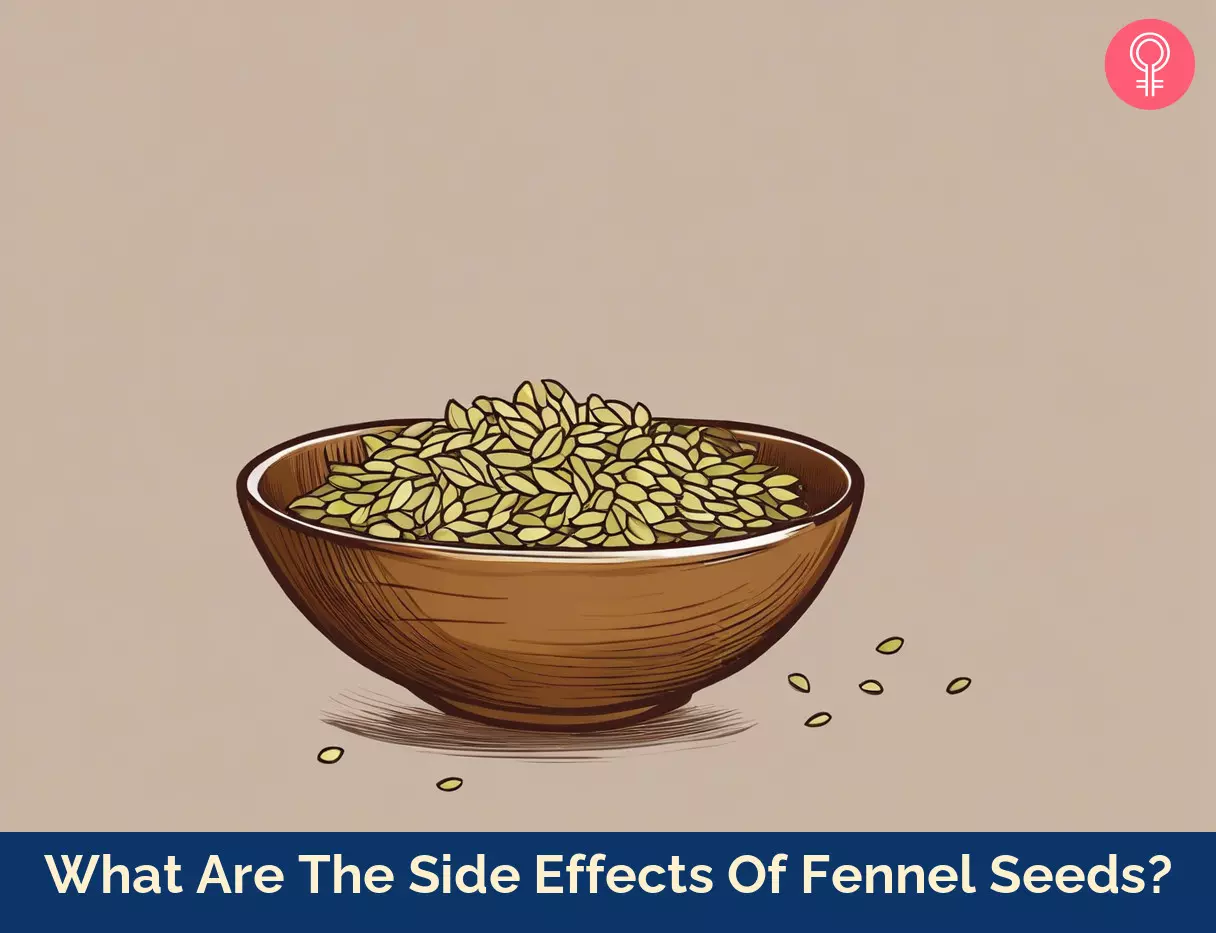When you eat the recommended dose of fennel seeds, they are quite safe. But their overconsumption can cause phytophotodermatitis, premature thelarche, contact dermatitis, and /or an allergic reaction. Read on to find out the side effects of fennel seeds!
Fennel Seeds Side Effects
1. May Cause Phytophotodermatitis
Fennel seeds contain phototoxic compounds called psoralens. When the skin comes in contact with these compounds, and this is followed by exposure to sunlight, it results in the formation of blister-like patches and inflammation on your skin. This condition is called phytophotodermatitis (1). Other symptoms of phytophotodermatitis include pain and redness, and, in some extreme cases, chills, fever, dizziness, and headache. Drug Interactions May interact with anticoagulant, antibiotic, and antiplatelet drugs. When To See A Doctor If you see allergic reactions like skin rashes, hives, shortness of breath nausea, and vomiting or experience seizures and disturbed bowel movements.
2. May Interact With Drugs
If you are under medication for seizure disorders or epilepsy, fennel seeds are a big no. The seeds interact with the functioning of the drug and may aggravate the situation (3).
3. May Cause Premature Thelarche
Thelarche is a condition that marks the start of breast development in women at the beginning of puberty. Fennel can cause premature thelarche. In a study, consumption of two to three teaspoons of fennel tea every day had led to breast development in a 12-month-old girl (4). The breast development regressed and became normal by the end of one year after stopping fennel consumption.
4. May Cause Contact Dermatitis
Contact dermatitis is a skin condition, the symptoms of which include skin inflammation and an outburst of blisters. Fennel seed oil is known to cause contact dermatitis and other cross-reactions (5).
5. May Cause Allergy
Fennel seeds can cause allergies. Mostly, people with pre-existing allergies are vulnerable to allergies caused by fennel (6). Abdominal cramps and wheezing are the other symptoms of allergic reactions.
6. May Stimulate The Uterus
One of the most talked-about fennel seeds’ side effects is that they stimulate the uterus and also cause menstrual irregularities (7). Fennel seeds should not be consumed by pregnant women as the seeds can stimulate uterine contractions and cause premature delivery.
7. May Inhibit Drug-Metabolizing Enzymes
A constituent of fennel seeds is known to inhibit a drug-metabolizing enzyme called cytochrome P450 3A4 (8). This reduces the effectiveness of medications that are metabolized by these enzymes. Hence, not consuming fennel seeds while under such medication is the best option.
8. May Significantly Lower Blood Sugar Level
Fennel seeds may help lower blood sugar levels as they can enhance insulin sensitivity and reduce glucose absorption in the intestines. They contain flavonoids and polyphenols that possess antioxidant and anti-diabetic properties (9). However, while consuming fennel seeds as part of a balanced diet may contribute to better glycemic control, they should not be considered the sole treatment for diabetes (10). You should especially avoid consuming them if you are already on diabetes medication to control hyperglycemia (high blood glucose) as it can cause your blood sugar to drop to a dangerously low level. Consult a healthcare professional for comprehensive diabetes management.
9. May Cause Weight Gain
Fennel seeds are generally said to support weight management as they are low in calories, aid digestion, reduce bloating, and curb appetite by promoting a feeling of fullness (11). However, research suggests that fennel seeds may cause slight weight gain in overweight postmenopausal women . Fennel seeds contain phytoestrogens that could lead to an increase in body weight. Also, these seeds are said to have varying effects on menopausal women that may negatively affect their body weight and fat distribution (12).
10. Other Toxicities
Fennel seed oil was found to be detrimental to DNA. Also, a constituent of fennel called estragole was found to cause tumors in animals (13). If you have any kind of hormone-sensitive disease like cancer, strict medical advice is mandatory before consuming fennel. You should be careful when consuming fennel seeds and be cautious about their dosage. Keep reading to learn more about the proper dosage recommendation for funnel.
Dosage Information
When consuming fennel seeds for health benefits, a typical dosage ranges from 1 to 2 teaspoons (about 5 to 10 grams) per day. They can be consumed whole, ground into a powder, or steeped in hot water to make tea. It is best to start with small amounts and monitor how your body responds. Pregnant women and those with certain health conditions should consult a healthcare professional before adding fennel seeds to their diet to ensure it is appropriate for their specific situation. Is it ok to eat raw fennel? Yes, it is ok to eat raw fennel. Fennel has a crunchy texture and a mildly sweet flavor, which make it a pleasant addition to any dish. Do fennel seeds increase body heat? No. The seeds have a cooling effect on the body. You can have a fennel seed drink in summer to feel cool and refreshed. How can you tell if fennel has gone bad? If fennel turns discolored and soft or develops brown marks on its white layers, it indicates spoilage. Also, if fennel smells off-putting, discard it. How long does fennel last in the fridge? It lasts 5 to 10 days if you are getting it directly from the garden. Trim the fronds to two or three inches above the bulb of fennel. Wrap loosely in a plastic bag and store in the fridge. Are fennel seeds harmful for lactating women? Though fennel is a purported galactagogue (a food that promotes or increases the flow of a mother’s milk), excess consumption can cause toxicity in newborns and diarrhea and liver damage in the mother (14). Does fennel affect blood pressure? There are currently no studies that suggest that fennel has a negative effect on blood pressure. However, research suggests that fennel is commonly used to treat hypertension (high blood pressure) (15). Does fennel seed affect thyroid? Research shows that long-term exposure to fennel can cause damage to the thyroid gland. It can lead to a reduction in thyroid hormone serum levels which may cause hypothyroidism (16). Do fennel seeds increase estrogen? Research indicates that fennel seeds have very little impact on estradiol levels (a type of estrogen) (17). Does fennel cause constipation? No, there are currently no studies that suggest that fennel seeds may cause constipation. Fennel may help improve bowel movement and help relieve constipation (18). Does fennel cause digestive problems? No, studies suggest that fennel seeds help relieve gas, bloating, heartburn, and even help with nausea and vomiting. It even helps with kidney damages (18).
Illustration: What Are The Side Effects Of Fennel Seeds?
Discover the hidden side effects of fennel. From digestive troubles to hormonal imbalances, this eye-opening video reveals the surprising downsides of this spice.












